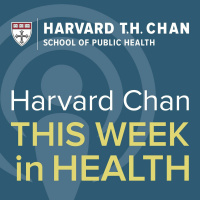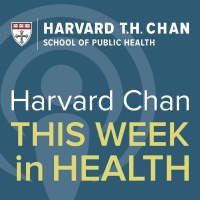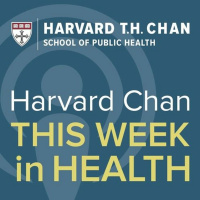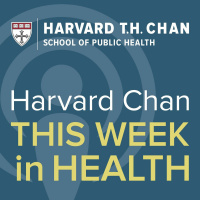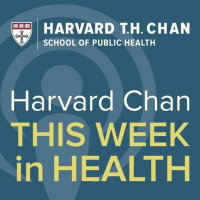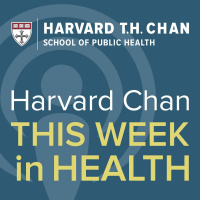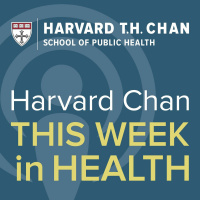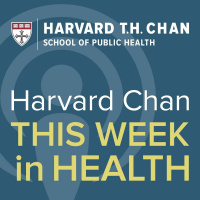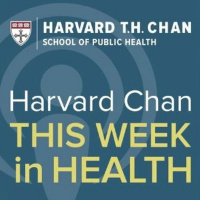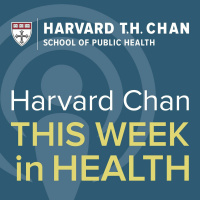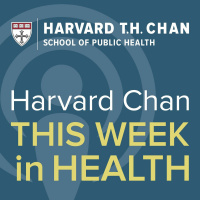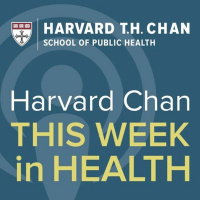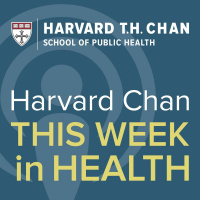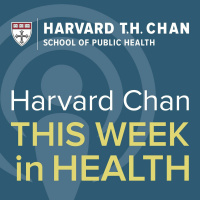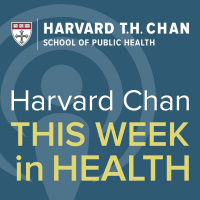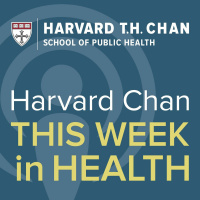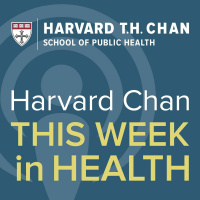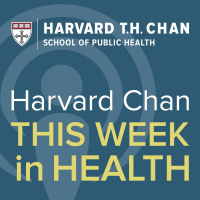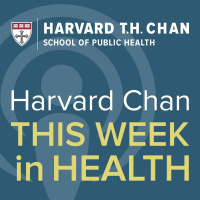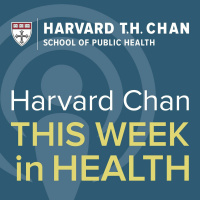Harvard Public Health
- Autor: Vários
- Narrador: Vários
- Editor: Podcast
- Duración: 57:02:16
- Mas informaciones
Informações:
Sinopsis
A community of leaders producing powerful ideas that transform the lives and health of people everywhere.
Episodios
-
January 10, 2019: A virtual visit with your doctor
10/01/2019 Duración: 22minFor many Americans, a visit with their doctor no longer requires an actual trip to the doctor’s office. More physicians are offering so-called “telemedicine” services, where they provide care to patients via smart phones, tablets, and computers. And while telemedicine is being more used more frequently across the U.S., it’s still relatively uncommon, according to a new study led by Michael Barnett, assistant professor of health policy and management at Harvard Chan School. In this week's episode we speak to Barnett about the rise of telemedicine, ways to further increase its use, and how this technology could improve health care for patients in the years to come. Full Transcript: https://hsph.me/virtual-pod
-
December 19, 2018: The simple solution that has saved millions of lives
19/12/2018 Duración: 24minOral rehydration solution (ORS)—a mixture of water, sugar, and salt that is administered as part of oral rehydration therapy (ORT)—is credited with preventing tens of millions of deaths from cholera and other diarrheal diseases. In this week's podcast you'll hear from two scientists who helped bring this simple, low-tech, and cost-effective treatment into worldwide use. Richard Cash, senior lecturer on global health at Harvard T.H. Chan School of Public Health, and David Nalin, professor emeritus at Albany Medical College, collaborated on groundbreaking clinical studies showing that ORT was remarkably effective in reversing dehydration. This episode is a collaboration with Harvard Global Health Institute.
-
December 7, 2018: The power of a family meal
07/12/2018 Duración: 21minFor busy families, gathering together for a meal—whether it’s breakfast or dinner—can be difficult. But a growing body of research shows that these meals together can have an important influence on the quality of food that children and teens eat. However, there’s been less research on effective ways to encourage families to eat together more often. In this week’s episode we’re speaking with Kathryn Walton, research fellow at the Hospital for Sick Children in Toronto and a PhD student at the University of Guelph in Toronto, about a new study that could help public health professionals target interventions at busy families. Walton and a team of researchers, including Bryn Austin, professor in the Department of Social and Behavioral Sciences, found that when families sit down together for dinner, adolescents and young adults eat more fruits and vegetables and consume fewer fast-food and takeout items. What’s unique about this study is that Walton and her colleagues looked at the families participating in the mea
-
November 21, 2018: A conversation with a public health pioneer
21/11/2018 Duración: 42minIn this week's episode we bring you an in-depth conversation with a public health pioneer. During her five-decade career, Marie McCormick, Sumner and Esther Feldberg Professor, emerita, at Harvard T.H. Chan School of Public Health, has worked on a range of issues: from the health of pre-term babies to vaccines to cannabis. McCormick began her career as a pediatrician and conducted groundbreaking research on the outcomes of high-risk infants, especially preterm infants, and the evaluation of programs to improve their health and development. During our conversation we covered all of that, plus McCormick’s views on the future of child and maternal health, including the need to address poverty’s role in childhood health.
-
Nov. 02, 2018: How accurate are health headlines in your social media feed?
02/11/2018 Duración: 26minEvery day we are bombarded with health news in our social media feeds: from studies touting the benefits—or harms—of a particular food to research on a new treatment for a disease. But how accurate are those headlines? That's the question a multidisciplinary research team led by Noah Haber, ScD '19, tried to answer. And their findings showed that health news shared in social media is likely to be overstated and/or inaccurate. In this week’s episode, we speak with Haber about how that happens—and what can be done to improve health reporting.
-
October 18, 2018: Your phone knows how you feel
18/10/2018 Duración: 14minMany of us spend hours each day on our smartphones, whether it's texting friends or using our GPS for directions. And each of those actions leaves behind a digital breadcrumb. In this week's episode we're digging into our archives to explain how researchers are mining this data to improve health. JP Onnela, associate professor of biostatistics at Harvard T.H. Chan School of Public Health, will explain how harnessing smartphone information can be used to improve everything from our mental health to recovery from surgery.
-
Sept. 27, 2018: Can we solve the migration crisis?
27/09/2018 Duración: 29minEvery minute 24 people around the world are forced to leave their homes—and it’s estimated that more than 65 million people are currently displaced. In this week’s episode, we explore the global refugee and migration crisis with Jacqueline Bhabha, Professor of the Practice of Health and Human Rights at Harvard T.H. Chan School of Public Health and Director of Research at the FXB Center for Health and Human rights. Bhabha has studied migration extensively, and focuses on potential solutions to the crisis in her new book, “Can We Resolve the Migration Crisis?” In this interview, Bhabha speaks about the myriad factors driving the current refugee and migration crisis, how rising nationalism and xenophobia worldwide is affecting migration, and the policy changes needed to build a better global migration system.
-
September 6, 2018: A call for redesigning American streets
06/09/2018 Duración: 21minIn this week’s podcast we’ll explore how America’s streets can be redesigned to benefit bicyclists and pedestrians—and we’ll explain why doing so may even help mitigate the effects of climate change. A new study from Anne Lusk, research scientist in the Department of Nutrition at Harvard T.H. Chan School of Public Health, analyzed how bicyclists and pedestrians responded to various placements of trees along cycle tracks—barrier-protected bicycle-exclusive paths between the road and the sidewalk. The research shows that the placement of these trees can play an important role in how people walking and biking perceive traffic, pollution, heat, and even safety. But the benefits extend beyond just those using the street—and could even be a factor in mitigating the effects of climate change. These trees may make it more likely that people will bike—helping to reduce pollution. And increased greenery can also help cool cities, which often suffer from a heat island effect, which means they’re significantly warmer tha
-
August 10, 2018: Designing for climate change
10/08/2018 Duración: 24minA new study from Harvard T.H. Chan School of Public Health found that students who lived in dormitories without air conditioning during a heat wave performed worse on a series of simple tests compared with students who lived in air-conditioned dorms. The findings show that the effects of extreme heat are not just felt by those typically thought of as vulnerable—such as the elderly. And with global temperatures on the rise, the research underscores the need for sustainable design solutions in mitigating the health impacts of extreme heat. In this week's episode, we'll speak with the authors of that study to learn how we can better design our buildings and cities to adapt to our changing climate. You'll hear from Joe Allen, assistant professor of exposure assessment science and director of the Healthy Buildings Program at the Center for Climate, Health, and the Global Environment, and Jose Guillermo (Memo) Cedeño Laurent, associate director of the Healthy Buildings Program.
-
July 24, 2018: Food Insecurity as a public health issue
24/07/2018 Duración: 28minThe Supplemental Nutrition Assistance Program (SNAP) helps 40 million low-income Americans afford food each month. But the program's future is uncertain as Congress debates the Farm Bill, a multi-year spending bill that will expire on September 30. The Trump administration has proposed significant changes—including cuts in funding—that could shape SNAP in the years ahead. In this week's episode we examine how changes in SNAP are likely to affect the health of food insecure Americans. You'll hear from Sara Bleich, professor of public health policy at Harvard T.H. Chan School of Public Health, and Hilary Seligman, a primary care physician and associate professor of medicine and of epidemiology and biostatistics at University of California, San Francisco. This episode is a collaboration with Review of Systems, from the Center for Primary Care at Harvard Medical School.
-
July 12, 2018: Every business has an impact on health
12/07/2018 Duración: 44minEvery company has an impact on health—both positive and negative—whether they realize it or not. And in this episode we're taking an in-depth look at the links between businesses and health. Harvard T.H. Chan School of Public Health recently partnered with Harvard Business School to launch a new initiative called Culture of Health (COH): A Business Leadership Imperative. The goals: encourage business leaders to prioritize the protection and promotion of health and wellbeing and understand how some companies are already contributing to health—and how to encourage others to do so. You'll hear from three researchers spearheading this work: Howard Koh is the Harvey V. Fineberg Professor of the Practice of Public Health Leadership and principal investigator of the Culture of Health program; John McDonough is professor of public health practice and a co-principal investigator; and Eileen McNeely is an instructor in the Department of Environmental Health and director of the Sustainability and Health Initiative for N
-
June 21, 2018: Eliminating trans fats
21/06/2018 Duración: 14minIn this episode we're marking a major public health milestone. As of Monday, June 18, U.S. food manufacturers are banned from creating products with artificial trans fats—found in partially hydrogenated oils. This ban is the culmination of decades of research and work, and we'll explore how these fats became such a mainstay in American foods, the work to expose their risks, and the public health impact of eliminating them. You'll hear from two experts who were on the front lines of the battle against trans fats: Walter Willett, professor of epidemiology and nutrition at Harvard T.H. Chan School of Public Health, and Michael Jacobson, senior scientist and former executive director of the Center for Science in the Public Interest (CSPI).
-
June 14, 2018: What's behind a resurgence of mumps in the United States?
14/06/2018 Duración: 22minIn the early 21st century there was hope that the success of the mumps vaccine in the United States would pave the way for the eventual elimination of the highly contagious disease. But since 2006 there's actually been a resurgence of mumps. In this week's podcast Yonatan Grad, assistant professor of immunology and infectious diseases, explains how the waning effectiveness of the vaccine may be contributing to outbreaks of the virus.
-
May 31, 2018: Gina McCarthy's mission to protect public health and defend science
31/05/2018 Duración: 29minThis week the Harvard Chan School launched the new School-wide Center for Climate, Health, and the Global Environment (C-CHANGE). Under the leadership of Director Gina McCarthy, C-CHANGE will use science to drive action on climate change and improve public health. It's something McCarthy is familiar with; as former U.S. Environmental Protection Agency (EPA) Administrator, she led the Obama administration's efforts to combat climate change. In this week's episode we sit down with McCarthy for a passionate conversation about climate change, public health, and science. McCarthy explained why scientists need to change how they communicate about climate change to convey the human health effects, shared how we all can get involved to drive environmental changes at the local level, and weighed in on the Trump Administration’s attacks on science and the mission of the EPA.
-
May 22, 2018: Student stories
24/05/2018 Duración: 19minThis week more than 650 students from dozens of countries graduated from the Harvard Chan School. Each graduate has their own amazing story—with powerful reasons for pursuing public health. We can’t share them all, but this week we’re sharing three stories. Alice Han, MPH '18, is calling attention to the "pandemic" of violence against women; Garang Dut, MPH '18, was inspired by his experience as a refugee to address health care inequities; and Jon Jay, DrPH '18, is using data science to improve health in cities. You’ll learn why each of these students pursued public health—and how they’re hoping to make an impact after graduation.
-
May 10, 2018: What can we learn from a 'null' study result?
10/05/2018 Duración: 31minBetween 2014-2016, Researchers from Ariadne Labs ran an ambitious trial to see if a simple checklist could improve childbirth care and prevent deaths in one of India’s poorest states. The randomized study of 300,000 women in Uttar Pradesh was one of the largest maternal health trials ever. Both the stakes and hopes were high; globally, 300,000 women a year die around the time of childbirth and five million newborns die as stillborn or in their first month of life. But the results of the study were mixed—what researchers call a "null" result. While the checklist improved the quality of care during labor and delivery, it did not reduce death rates. In this week's episode, we speak to Katherine Semrau, director of the BetterBirth program at Ariadne Labs and the lead author of the study, about why that “null” result can actually teach us a great deal about strategies to improve maternal health—and the way public health research is conducted.
-
May 3, 2018: Achieving health equity in the Americas
03/05/2018 Duración: 36minIn recent years countries across the Americas have made major improvements in health, but while life expectancy has increased and infant and maternal mortality rates have fallen, significant inequalities remain. A new commission launched by the Pan American Health Organization (PAHO) is now examining ways to close those gaps. Members of the commission were recently convened by David Satcher at Morehouse School of Medicine to discuss strategies for achieving health equity. As part of the gathering, Michael Marmot, chair of the commission and one of the world's foremost researchers on health inequality, delivered a keynote address: “How Do You Achieve Change?” In this week's episode, we're sharing that talk, which outlines vast disparities across the Americas—and explains how addressing the social determinants of health can help narrow disparities.
-
April 19, 2018: Privacy as a human right
19/04/2018 Duración: 17minThe recent scandal over Facebook's use of personal information has shone fresh light on one of the most pressing issues of the 21st century: How can we protect our privacy when we are willingly—or unwillingly—giving vast amounts of data to companies like Facebook, Google, or Amazon. But those technology companies aren’t the only ones using personal information. This kind of data is also at the core of the work of international agencies delivering humanitarian aid. In this week's episode we speak with Dan Scarnecchia, a researcher with the Signal Program on Human Security and Technology based at the Harvard Humanitarian Initiative. Scarnecchia and his colleagues recently wrote the Signal Code, which represents a human rights approach to privacy and data during crises. We'll examine how the humanitarian field is now grappling with ever-changing technology and increasing reliance on data and personal information.
-
April 12, 2018: Is global health aid distributed fairly?
12/04/2018 Duración: 29minBillions of dollars in global health aid are distributed around the world each year. But the process by which that funding is distributed—often by large multilateral agencies— is frequently opaque and difficult to understand. In this week's episode we explore the state of the global health aid landscape—and examine ways to improve transparency and make aid distribution more equitable. You'll hear from Jesse Bump, executive director of the Takemi Program in International Health and lecturer on global health policy. Bump and several co-authors recently wrote about global health aid in a special supplement in the journal Health Policy and Planning. We spoke with him about the aid distribution process, how it can be improved—and importantly—how the countries that receive this aid can have a louder voice in the process.
-
March 29, 2018: The plasticity of the aging process
29/03/2018 Duración: 38minWe often think of aging as an inevitable physical decline; as we get older our bodies break down and diseases begin to multiply. But what if that wasn't the case? What if we could change how we age and make our later years more healthy and fulfilling? That's the question we explore during our in-depth conversation with Will Mair, associate professor of genetics and complex diseases. Mair's Lab explores the basic biology of the aging process—trying to understand why we are more likely to get chronic diseases when we are old than when we are young. They seek to understand what is actually going wrong in our cells and tissues to increase the risk of age-related disease, and then work to find ways to reverse that. It's fascinating research that has the potential to change how we think about aging and age-related diseases.

